
-

Symphonola 146 "Trashcan"
1946 -

Symphonola 147 "Trashcan"
1947 -

Symphonola 148 "Trashcan"
1948 -
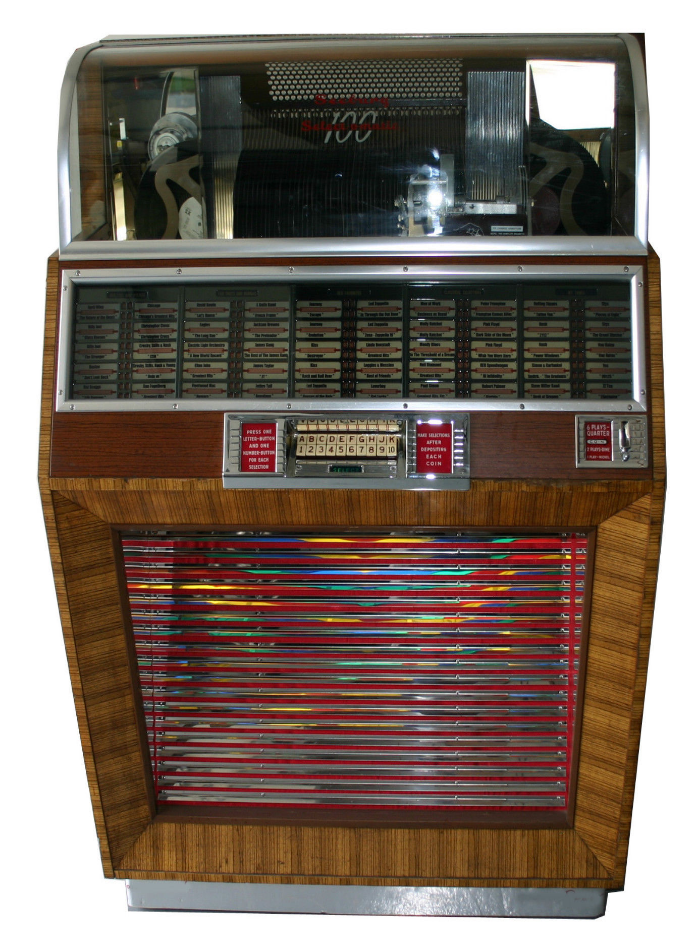
M100A
1948-1951 -

M100B
1948-1951 -

M100C
1952 -

100W
1953 -

HF100G
1953 -
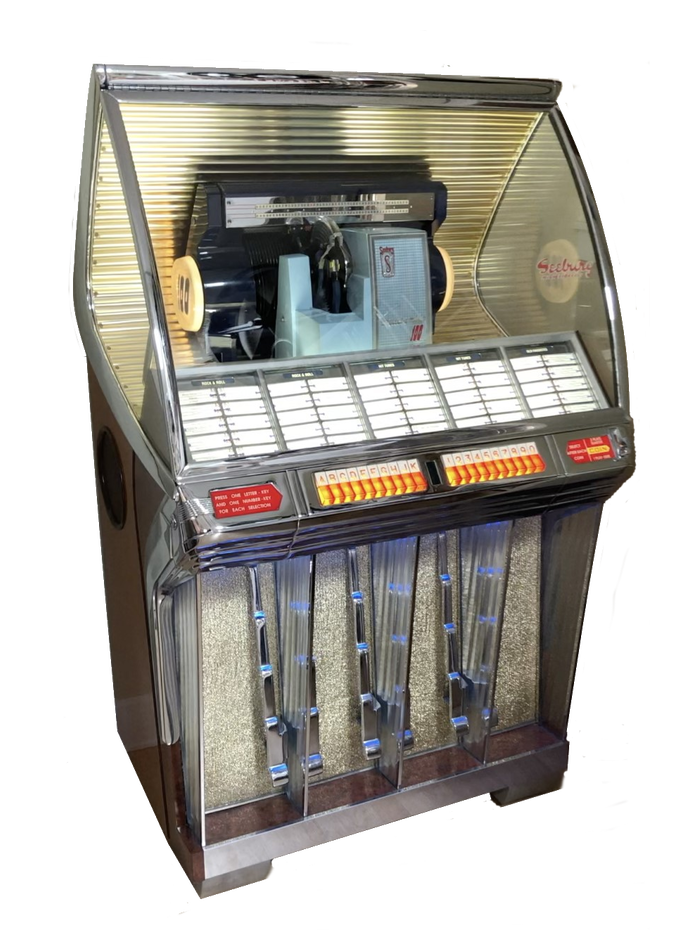
HF100R
1954 -

100J/100JL
1955-1957 -

V200/VL200
1955-1957 -

L100/L101
1957 -

KD200/KS200
1957 -

161
1958 -
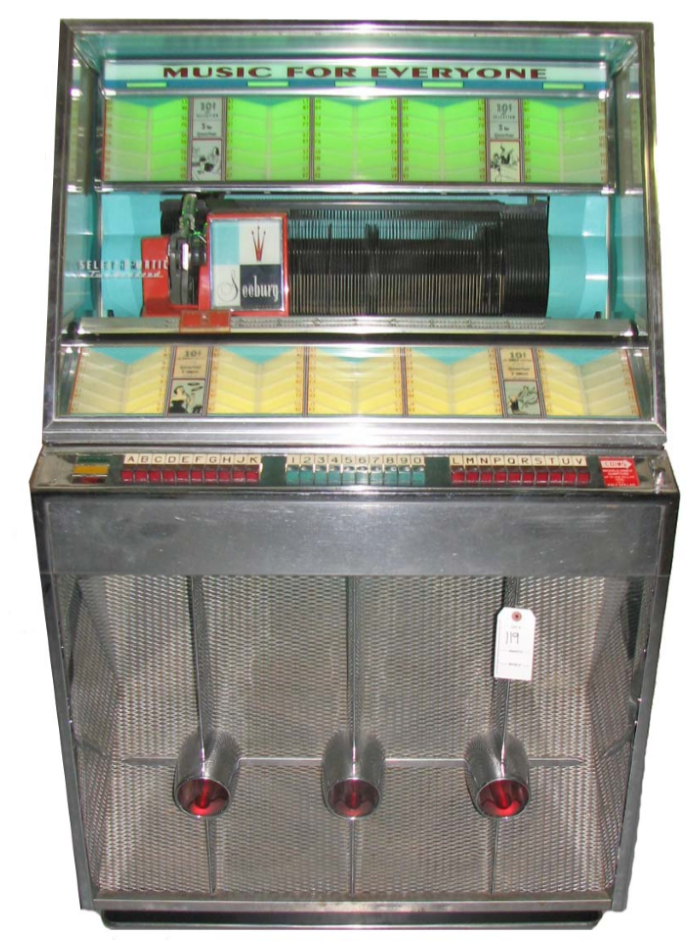
201
1958 -

220 "Channel"
1958-1959 -

222 "Channel"
1958-1959 -
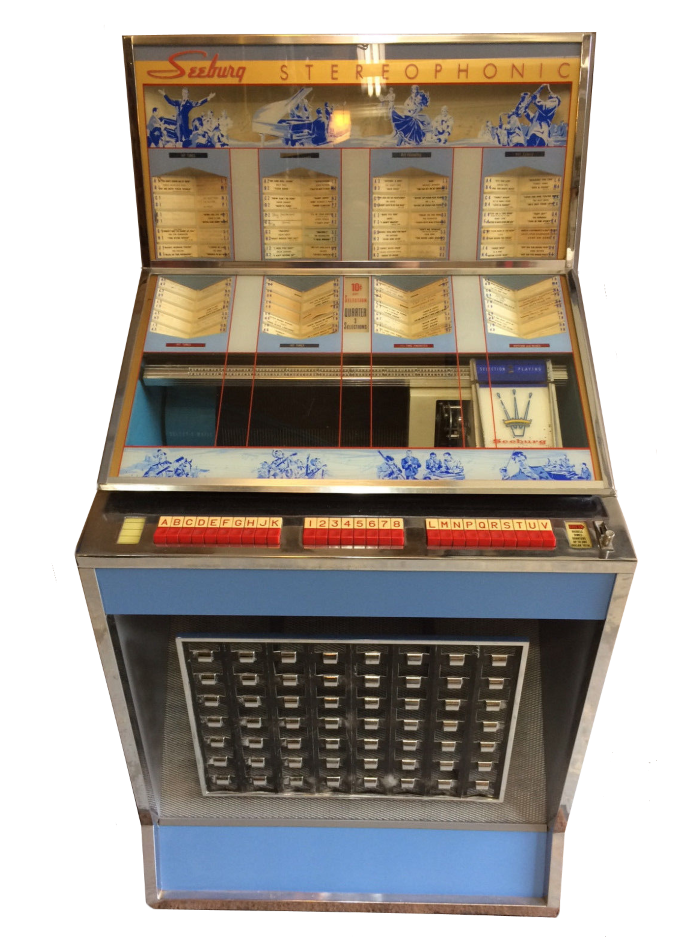
AQ100/AQ160
1960 -
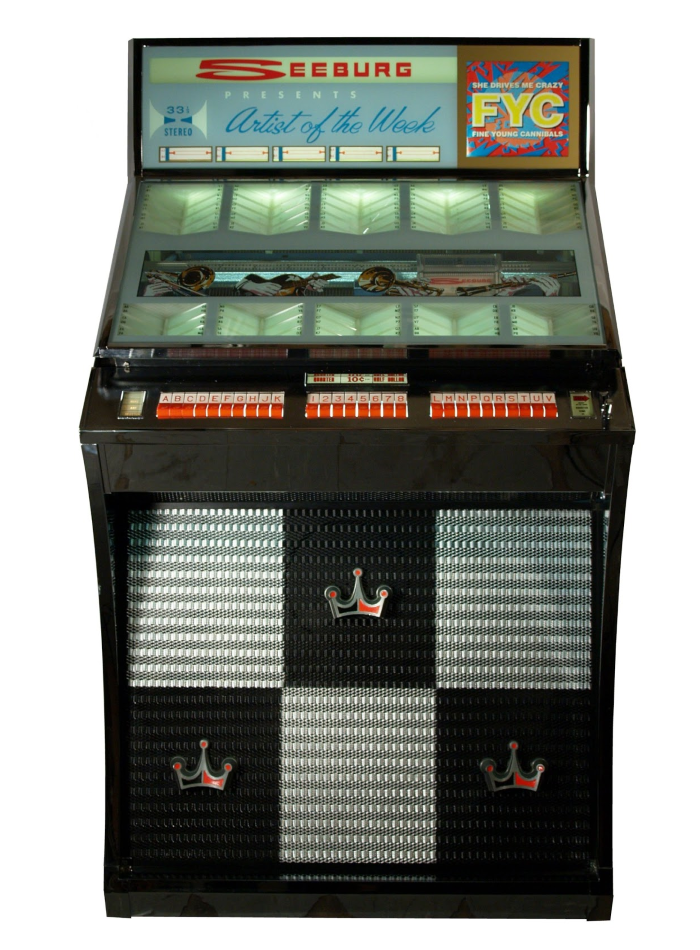
AY100/AY160
1961 -

DS100/DS160
1962 -

LPC-1
1963-1964


The Trashcan has been manufactured in the years 1946 - 1948 (hence the model numbers Symphonola 146, 147, 148). The first model year was based on a wood cabinet; model 147 was available first with a wood, later with a metal cabinet with faux wood finish, the cabinet for the 148 was always made from aluminum.
| Model | Symphonola 146 |
|---|---|
| Year(s) | 1946 |
| Speed | 78 rpm |
| # Selections | 20 |
| # Records | 20 |
| Produced | ± 25.400 |
| Dimensions (HxWxD) | 145 x 91 x 67 cm (57 x 36 x 26.5") |
| Weight | 161 kg (355 Lbs) |
| Sales | Symphonola 146 Flyer |


The Trashcan has been manufactured in the years 1946 - 1948 (hence the model numbers Symphonola 146, 147, 148). The first model year was based on a wood cabinet; model 147 was available first with a wood, later with a metal cabinet with faux wood finish, the cabinet for the 148 was always made from aluminum.
| Model | Symphonola 147 |
|---|---|
| Year(s) | 1947 |
| Speed | 78 rpm |
| # Selections | 20 |
| # Records | 20 |
| Produced | ± 22.950 |
| Dimensions (HxWxD) | 1145 x 91 x 67 cm (57 x 36 x 26.5") |
| Weight | 144 kg (317 Lbs) |


The Trashcan has been manufactured in the years 1946 - 1948 (hence the model numbers Symphonola 146, 147, 148). The first model year was based on a wood cabinet; model 147 was available first with a wood, later with a metal cabinet with faux wood finish, the cabinet for the 148 was always made from aluminum.
| Model | Symphonola 148 |
|---|---|
| Year(s) | 1948 |
| Speed | 78 rpm |
| # Selections | 20 |
| # Records | 20 |
| Produced | ± 14.650 |
| Dimensions (HxWxD) | 1145 x 91 x 67 cm (57 x 36 x 26.5") |
| Weight | 147 kg (325 Lbs) |


Sleek, simple and wooden design of the Seeburg M100A, which would later also be referred to as the Swedish design in the jukebox area, referring to the origin of Seeburg's founder. Not only the design, but the unprecedented and first offering of 100 selections kept the competition at a distance in a bewildered way.
| Model | M100A "Select-o-matic" |
|---|---|
| Year(s) | 1948-1951 |
| Speed | 78 rpm |
| # Selections | 100 |
| # Records | 50 |
| Produced | ± 28.800 |
| Dimensions (HxWxD) | 140 x 92 x 74 cm (55 x 41 x 29") |
| Weight | 171 kg (378 Lbs) |
| Sales | M100A Flyer |


Where the M100A was already revolutionary and was the first jukebox with 100 selections and the first jukebox of the silver age, the M100B would unleash a new revolution a year later. With the M100B the first 45-speed jukebox was created, where the design of the M100A was kept the same as possible with this new version.
| Model | M100B |
|---|---|
| Year(s) | 1950-1951 |
| Speed | 45 rpm |
| # Selections | 100 |
| # Records | 50 |
| Produced | ± 27.100 |
| Dimensions (HxWxD) | 137 x 86 x 71 cm (54 x 34 x 28") |
| Weight | 140 kg (310 Lbs) |
| Sales | M100B Flyer |
| Operation | M100B Manual |


The M100C was put on the market in 1952. The design still looked somewhat like the M100A and M100B, but was redesigned. A richer and more colorful design somewhat offset the understated wooden cabinets of the M100A and M100B, although it was clearly the third jukebox in this series. For example, the selection mechanism and the design of the title card holder and the keyboard was largely the same, making the model look recognizable as a Seeburg.
| Model | M100C |
|---|---|
| Year(s) | 1952 |
| Speed | 45 rpm |
| # Selections | 100 |
| # Records | 50 |
| Produced | ± 38.200 |
| Dimensions (HxWxD) | 137 x 89 x 66 cm (54 x 35 x 26") |
| Weight | 138 kg (305 Lbs) |
| Sales | M100C Flyer |
| Operation | M100C Manual |


Since several owners complained about the fragile design of the M100C with the wooden title card front and the fragile plastic revolving pilasters, both the 100W and the HF100G were more solidly executed on the outside. The wooden front was replaced with a chrome front on both models and the revolving columns had disappeared. The 100W still had plastic columns, but the HF100G had the stronger metals, chrome, pilasters.
| Model | 100W |
|---|---|
| Year(s) | 1953 |
| Speed | 45 rpm |
| # Selections | 100 |
| # Records | 50 |
| Produced | ± 5.575 |
| Dimensions (HxWxD) | 137 x 89 x 66 cm (54 x 35 x 26") |
| Weight | 150 kg (330 Lbs) |
| Sales | 100W/HF100G Flyer |


Since several owners complained about the fragile design of the M100C with the wooden title card front and the fragile plastic revolving pilasters, both the 100W and the HF100G were more solidly executed on the outside. The wooden front was replaced with a chrome front on both models and the revolving columns had disappeared. The 100W still had plastic columns, but the HF100G had the stronger metals, chrome, pilasters.
| Model | HF100G |
|---|---|
| Year(s) | 1953 |
| Speed | 45 rpm |
| # Selections | 100 |
| # Records | 50 |
| Produced | ± 15.850 |
| Dimensions (HxWxD) | 137 x 89 x 66 cm (54 x 35 x 26")) |
| Weight | 147 kg (325 Lbs) |
| Sales | 100W/HF100G Flyer |


The Seeburg HF 100R Jukebox is one of the most sought-after of all the 50’s jukeboxes. The model features the chrome accents and visible Select-O-Matic system that was, and still is, so popular among collectors of jukeboxes from the Silver Age. It holds 50 records and is capable of playing up to 100 selections at a time. There are 5 speakers with a high-fidelity sound and a lightning bolt design across the speaker grill. The glass lid is larger on this model than on previous models, to allow for greater visibility of the mechanism.
| Model | HF100R |
|---|---|
| Year(s) | 1954 |
| Speed | 45 rpm |
| # Selections | 100 |
| # Records | 50 |
| Produced | ± 26.850 |
| Dimensions (HxWxD) | 150 x 90 x 69 cm (59 x 35.5 x 27") |
| Weight | 147 kg (325 Lbs) |
| Sales | HF100R Flyer |


First 200-selection machine by Seeburg, both machines are identical except for color schemes and metal plating. These boxes are the most sought after Seeburg jukeboxes. They have a unique rotating title strip drum. The V-200 commands a high price due to 24 caret gold plating.
| Model | V200/VL200 |
|---|---|
| Year(s) | 1955-1957 |
| Speed | 45 rpm |
| # Selections | 200 |
| # Records | 100 |
| Produced | ± 24.550 |
| Dimensions (HxWxD) | 144 x 93 x 70 cm (56.5 x 36.5 x 27.5") |
| Weight | 189 kg (416 Lbs) |
| Sales | V200 Flyer |


In terms of production, the benefits of this new design were clear; the rectangular flat windows were easier to produce than the curved windows that were used before. Another design element from the KD200, one may say THE design element of the KD200, was the use of the "rear lights" in the grill. The difference between the KD-200 and the KS-200 is in the price unit in the jukebox; the D in KD stands for Dual pricing unit and the S in KS stands for Single pricing unit.
| Model | KD200/KS200 |
|---|---|
| Year(s) | 1957 |
| Speed | 45 rpm |
| # Selections | 200 |
| # Records | 100 |
| Produced | ± 11.900 |
| Dimensions (HxWxD) | 147 x 89 x 70 cm (58 x 35 x 27.5") |
| Weight | 181 kg (400 Lbs) |
| Sales | KD200 Flyer |


The first jukebox with 160 selections: Model 161 extended the previous 200 and 100 selection line.
| Model | 161 |
|---|---|
| Year(s) | 1958 |
| Speed | 45 rpm |
| # Selections | 160 |
| # Records | 80 |
| Produced | 161&201: ± 8.175 |
| Dimensions (HxWxD) | 142 x 77 x 67 cm (56 x 30.5 x 26.5") |
| Weight | 150 kg (330 Lbs) |
| Sales | 161-201 Flyer |


| Model | 201 |
|---|---|
| Year(s) | 1958 |
| Speed | 45 rpm |
| # Selections | 200 |
| # Records | 100 |
| Produced | 161&201: ± 8.175 |
| Dimensions (HxWxD) | 144 x 89 x 69 cm (56.5 x 35 x 27") |
| Weight | 170 kg (374 Lbs) |
| Sales | 161-201 Flyer |


Model 220 and 222 were not only Seeburg's but the first presented stereo jukebox in general. Introduced in Oct. 1958, next to this new feature Seeburg decided to drop the 200 selection line and offered 100 and 160 selection models only. The imprint "Channel 1" and "Channel " gave these models the nick-name "Channel".
| Model | 220 "Channel" |
|---|---|
| Year(s) | 1958-1959 |
| Speed | 45 rpm |
| # Selections | 100 |
| # Records | 50 |
| Produced | 220&222: ± 12.950 |
| Dimensions (HxWxD) | 142 x 83 x 68 cm (56 x 32.5 x 27") |
| Weight | 156 kg (343 Lbs) |
| Sales | 220-222 Flyer |


Model 220 and 222 were not only Seeburg's but the first presented stereo jukebox in general. Introduced in Oct. 1958, next to this new feature Seeburg decided to drop the 200 selection line and offered 100 and 160 selection models only. The imprint "Channel 1" and "Channel " gave these models the nick-name "Channel".
| Model | 222 "Channel" |
|---|---|
| Year(s) | 1958-1959 |
| Speed | 45 rpm |
| # Selections | 160 |
| # Records | 80 |
| Produced | 220&222: ± 12.950 |
| Dimensions (HxWxD) | 142 x 83 x 68 cm (56 x 32.5 x 27") |
| Weight | 156 kg (343 Lbs) |
| Sales | 220-222 Flyer |


| Model | AQ100/AQ160 |
|---|---|
| Year(s) | 1960 |
| Speed | 45 rpm |
| # Selections | AQ100: 100, AQ160: 180 |
| # Records | AQ100: 50, AQ160: 80 |
| Produced | AQ100 & AQ160: ± 8.875 |
| Dimensions (HxWxD) | 144 x 83 x 62 cm (56.5 x 32.5 x 24.5") |
| Weight | AQ100: 141 kg (310 Lbs), AQ160: 163 kg (360 Lbs) |
| Stepper | RCSU3 (optional) |
| Remote speaker | TWI-8 |
| Wallbox | DS100: 3W100, DS160: 3W160 |
| Cabinet Key | F264 |
| Sales | Not Available |


"Another Seeburg First!" and "... the old 45 is almost history." This is how Seeburg promoted the new Y-line in 1961. The new auto-speed-unit for 45 / 33 rpm was introduced as well as the "Artist of the Week" feature. Artists could be promoted in particuliar by inserting title strips and a record cover into special areas in the upper title glass. Seeburg called this "Music Selling Program". The AY100 and AY160 were the last Seeburg jukeboxes to feature a visible loading mechanism.
| Model | AY100/AY160 |
|---|---|
| Year(s) | 1961 |
| Speed | 45/33 rpm |
| # Selections | AY100: 100, AY160: 160 |
| # Records | AY100: 50, AY160: 80 |
| Produced | AY100 & AY160: ± 15.475 |
| Dimensions (HxWxD) | 144 x 83 x 62 cm (56.5 x 32.5 x 24.5") |
| Weight | 145 kg (320 Lbs) |
| Stepper | RCSU3 (optional) |
| Remote speaker | e.g. TW1-8 |
| Wallbox | DS100: 3W100, DS160: 3W160 |
| Cabinet Key | F264 |
| Sales | AY100 / AY160 Flyer |


| Model | DS100/DS160 |
|---|---|
| Year(s) | 1962 |
| Speed | 45/33 rpm |
| # Selections | DS100: 100, DS160: 160 |
| # Records | DS100: 50, DS160: 80 |
| Produced | DS100 & DS160: ± 12.225 |
| Dimensions (HxWxD) | 144 x 83 x 62 cm (56.5 x 32.5 x 24.5") |
| Weight | DS100: 141 kg (312 Lbs), DS160: 147 kg (325 Lbs) |
| Stepper | RCSU3 (optional) |
| Remote speaker | e.g. TW1-8 |
| Wallbox | DS100: 3W100, DS160: 3W160 |
| Cabinet Key | F264 |
| Sales | Not Available |


The LPC-1 was the first Low Profile Console on the market. Seeburg referred to it as Long Play Console since it played 7 - inch records at both 45 rpm and 33 1/3
| Model | LPC-1 |
|---|---|
| Year(s) | 1963-1964 |
| Speed | 45/33 rpm |
| # Selections | 160 |
| # Records | 80 |
| Produced | 21.350 |
| Dimensions (HxWxD) | 126 x 102 x 62 cm (49.5 x 40 x 24.5") |
| Weight | 168 kg (370 Lbs) |
| Stepper | RSCU4 (Optional) |
| Remote speaker | e.g. TW1-8 |
| Wallbox | Consolette SC1 |
| Cabinet Key | F278 |
| Sales | Not Available |